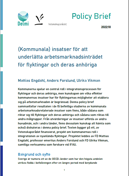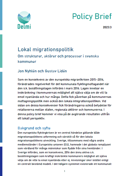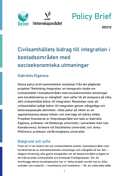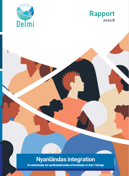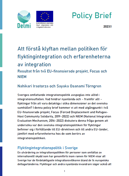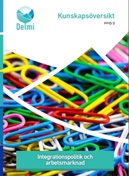In recent years, several reforms have been introduced to strengthen integration policy, where the state – through the Swedish Public Employment Service – has increasingly involved local governments and other local actors. It is precisely these local initiatives that have been at the center of the research project Changing roles, emerging networks. Local governments as employer, procurer and entrepreneur in labour market integration, funded by the Swedish Research Council within the national research program on migration and integration.
Delmi Policy Brief 2025:8 summarizes the main findings from this research project. A key conclusion is that municipalities in Sweden develop different ways of working with labor market integration depending on their local circumstances. For example, some municipalities face a strong demand for labor and many new residents, while others encounter entirely different challenges.
One important result is that work-integrating social enterprises (WISEs) play a significant role. These are businesses that combine commercial activity with a social purpose – creating jobs and participation for people who face difficulties entering the labor market, such as foreign-born women with low levels of education.
The study also shows that networks are crucial for making this work function. In this context, networks refer to organized collaborations between municipalities, civil society, public authorities and companies. Through such networks, actors can share experiences, spread knowledge and support each other – something that becomes particularly important in times when resources decrease or organizations undergo change.
Key conclusions and recommendations
- Give the periphery a more central place: Recognize and harness the innovative capacity that exists in local communities and on the margins of municipalities. Create arenas where local actors can contribute with their resources, language, culture and solutions, and ensure these experiences can influence national policy.
- Strengthen relations with work-integrating social enterprises (WISEs): Build long-term and stable collaborations through, for example, more durable work-training agreements, flexible procurement models, and financial support for intermediary organizations and networks.
- Support and develop networks: Ensure resources to build and sustain networks where local governments, civil society, public authorities and companies can exchange experiences and knowledge. This is crucial for retaining competence over time and managing changes in political and economic conditions.
- Broaden the view of integration: Understand integration as a holistic process that encompasses more than just employment, including health, education, housing and social participation. This makes it possible to include groups that otherwise risk being left out.
- Create robust organizational conditions: Provide local governments and civil society with long-term and predictable conditions. This means stable resources, clear regulations, and flexible organizations that can adapt when circumstances change, without losing capacity.
About the authors
Patrik Zapata is Professor of Public Administration, María José Zapata Campos is Professor of Business Administration, and Emma Ek Österberg is Associate Professor of Public Administration. All three are based at the University of Gothenburg.
The Policy Brief was published on 7 October 2025.
Photo by Avan Saleh on Unsplash.

